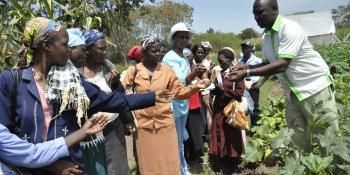Hybrid seeds and super goats: meet Kenya’s future farmers

Who else to put climate-smart farm techniques to the test if not farmers themselves?
“You know, us farmers are researchers too. We might not document everything, but since we try different things we know what can work on the farm,” says Edward Ouko with conviction as we walk past his latest farm experiment – testing hybrid melons. Since he has been trialing climate-smart practices and crops on his farm, he sure is one who knows what works in an increasingly variable climate.
Edward’s drought-resistant hybrid sorghum, called Seredo, is looking healthy as it stands tall in the sun. He tells us, a group of inquisitive communicators from the CGIAR Research Program on Climate Change, Agriculture and Food Security (CCAFS), that he has actually stopped growing maize, a staple crop in Kenya, altogether.
Not  only does the maize dry up, he says, he no longer likes the taste of it either.
only does the maize dry up, he says, he no longer likes the taste of it either.
In Kenya maize means everything; it is the mother of all crops. Because of maize’s prominence and value, farmers are not very open to switch to crops like sorghum or millet, which may be more robust and yield more. With a rapidly changing climate, however, farmers may not have a choice for much longer.
This is where Edward Ouko comes in. His role is to test new climate-smart farm practices, breeds and crops while teaching others how they too can use the same practices to boost yields and secure an income.
And who else to else to put climate-smart farm techniques to the test if not farmers themselves?
The village of climate-smart champion farmers
Together with multiple local partners CCAFS East Africa has set up a “climate-smart  village” in Nyando Western Kenya.
village” in Nyando Western Kenya.
Partners include Kenya Agriculture Research Institute (KARI), a number of CGIAR Research Centres like World Agroforestry Centre (ICRAF) and International Livestock Research Institute (ILRI), World Neighbors, ViAgroforestry, government ministries, community based organisations and the private sector like Magos Farm Enterprises.
The village is made up of farmers, like Edward Ouko, taking the lead in testing which climate-smart agriculture techniques and practices perform best in that particular context.
Climate-smart agriculture practices have the potential in helping farmers adapt to and mitigate climate change while boosting yields and improving incomes.
We have assisted farmers in this area with trainings on several climate-smart practices such as agroforestry, inter-cropping, how to manage hybrid seeds and animals and much more,"says Philip Kimeli, a researcher with the CCAFS East Africa program. "The hope is for farmers to start, for example, using hybrid seeds that are more droughts tolerant or mature faster, as they can see that these crops are working on other people’s farms."
Edward was trying to combat climate change on his own before CCAFS initiated its work. That was also why Edward came to be one of the 50 selected champion farmers for this project Philip Kimeli explains:
We made the conscious decision to work with farmers who were already testing new farm-practices and looking for ways to improve their yields. That way, we know that farmers will continue this work when we leave.”
Super goats reach Nyando’s farmers
In addition to testing hybrid seeds, the International Livestock Research Institute (ILRI), CCAFS and World Neighbors have together introduced a number of interesting sheep and goat breeds to farmers. These animals are more heat tolerant, mature faster and produce milk. Edward has received a few pure-bred German Alpint goats to test if they do well in the area.
With the help from World Neighbors and CCAFS, I am learning how to manage these goats, what to feed them and how to keep them healthy,” says Edward. “I then report back on how the goats are doing and how much milk they are producing.”
Edward tells us he can earn up to 10,000 KES (115 USD) from selling his cross-breed offsprings, which has helped him put his children through school. “My eldest daughter will soon finish high school,” Edward says with pride and a big smile, “and it was because I could sell the goats and milk that I could pay for her school-fees.”

Edward's hybrid goats are well taken care off. With the 3 liter milk they produce a day, Edward has enough to both sell and give his children. Photo: C.Schubert (CCAFS)
Since Edward has been active for some time now, he has been able to build a solid demonstration plot that could prove to have the key for long-term solutions for small-scale farmers in the area.
Without Edward and the rest of our 50 champion farmers in Western Kenya and partners supporting our research, by keeping track of activities, trialling, pushing themselves to test new things sharing information and ideas with other farmers, we wouldn’t be able to succeed and reach our goals of creating a food secure, more sustainable and resilient future for smallholder farmers.
Watch a video with Edward Ouko from the conference "Great Debate on the Battle to Feed a Changing Planet".
Meet other climate-smart farmers in this photo-set:



